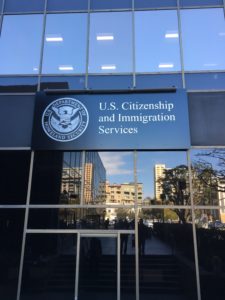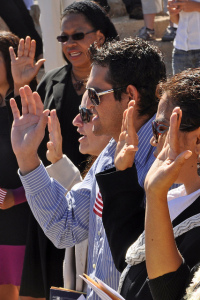
A USCIS Field Office in California approved both our client’s Form I-751 petition to remove conditions on residence and Form N-400 application for naturalization in a single naturalization interview, held in early March 2019. With the conditions on his residence now removed, he is set to attend his naturalization oath ceremony and become a U.S. citizen.
Conditional Resident Awaiting I-751 Decision May Consider Filing For Naturalization
In many cases, conditional residents are eligible to file for naturalization before the conditions on their residence are removed and they get the regular, 10-year green card. Persons who are granted marriage-based permanent residence when the marriage to the U.S. citizen petitioner is less than two years old are issued a two-year, conditional green card. To get the conditions removed and maintain lawful permanent residence, the applicant and his spouse must file a joint I-751 petition before the two-year card expires, and no earlier than 90 days before the expiration. There are only three types of waivers (exceptions) to the joint filing requirement.
Continuous residence is one eligibility requirement for naturalization. You must reside continuously in the U.S. for at least 5 years as a permanent resident at the time you file your naturalization application. An exception is if you are a qualified spouse of a U.S. citizen, in which case your continuous residence must be at least 3 years at the time you file for naturalization. Continuous residence for naturalization purposes begins on the start date of your permanent residence, even if it is conditional.
As of June 2018, USCIS began issuing Receipt Notices for I-751 petitions that automatically extend the conditional resident status for 18 months past the expiration date of the two-year card. Previously, the extension was for 12 months, after which the person would need to obtain a temporary I-551 stamp (evidence of conditional residence) at a local USCIS office. The change was made to accommodate longer processing times for I-751s and to allow conditional residents to automatically keep their lawful status and maintain work and travel authorization in the interim.
Naturalization Interview Scheduled Before Conditions Removed
Our client’s naturalization interview was scheduled before he received a decision on the Form I-751 petition. At the naturalization interview, the USCIS officer exercised his authority to approve the I-751 even though it was still sitting at a USCIS Service Center awaiting adjudication. This cleared the way for the conditional resident to become a U.S. citizen.
Filing of Form I-751 Petition
Although both the Form N-400 and Form I-751 may be pending at the same time, the I-751 must be filed first in most cases. The two exceptions are if the conditional resident is filing for naturalization on the basis of qualifying military service or as the spouse of a U.S. citizen employed abroad, and thus may be naturalized without removal of conditions. In all other situations, such as our client’s, USCIS needs to first approve the I-751 petition before naturalization may be granted.
In December 2017, we filed a timely, joint Form I-751 petition with the USCIS California Service Center in Laguna Niguel, California. To demonstrate the conditional resident entered into and continued to have a good faith marriage with his U.S. citizen spouse, we submitted affidavits describing their relationship, shared car insurance policy, joint bank account and credit card account statements, and evidence of their home ownership.
The I-751 was initially transferred from the California Service Center to another USCIS Service Center. In June 2018, we received a Transfer Notice from the Service Center in Arlington, VA stating it was transferring the I-751 back to the California Service Center to speed up processing. Then in December 2018, we received a Transfer Notice from the California Service Center stating it completed a preliminary review of the petition and was transferring the case to the National Benefits Center in Lee’s Summit, MO for adjudication.
Filing of Form N-400 Application
The I-751 had been pending with USCIS for 10 months when the naturalization application was filed. Within three months of receiving the Form N-400, our client received his naturalization interview notice. It did not instruct him to have his U.S. citizen spouse accompany him or to bring evidence of their bona fide marriage. Nonetheless, I counseled him to do so, particularly because USCIS had yet to approve the I-751 petition and lift the conditions on his residence.
Attorney Appearance at Out-of-State Naturalization Interview
With our law firm based in Minneapolis, Minnesota, I flew out to California to attend the naturalization interview. My client could have retained local counsel to appear with him, but he insisted on having me there. (U.S. immigration is governed by federal laws, regulations and policies, which allow for representation at a USCIS Field Office by an out-of-state attorney.)
The naturalization interview started off with his completing and passing the Civics Test and English Test. Then the USCIS officer went through his naturalization application, page by page.
To prepare for the naturalization interview, my client and I had discussed potential questions about his marriage to the U.S. citizen petitioner, their relationship history, and his U.S. immigration record. Among his concerns was that he had been previously denied entry to the United States as a visitor by the U.S. Customs & Border Protection, after being employed in the country on a temporary worker visa for an extended period. I advised him on how to best respond truthfully to this issue, which did end up being raised by the USCIS officer at the interview.
Naturalization Expected
When the USCIS officer stated he would approve the N-400 application, I reminded him the I-751 petition was still pending. The officer was not aware of this because the file had not been flagged. He agreed to call in the U.S. citizen spouse, who had accompanied us to the Field Office and was seated in the waiting room.
Both the conditional resident and his spouse answered questions and presented documentary evidence on the bona fide nature of their marriage. At the end of the interview, the officer said he would also approve the I-751 petition. Even though he did not have the original I-751 filing, and did not review the copy we had with us, he favorably adjudicated the petition based on the testimony and evidence presented.
A day after the interview, USCIS issued the Form I-797, Approval Notice for the I-751 petition. My client soon sent me an email stating, “When I checked online the status of the N-400 on USCIS website it now says they approved my application, and the next step is to wait for the Oath Ceremony invitation letter in the mail, so looking forward to this very much…Thanks again for all your help. You really made a difference in our lives.“
We expect him to be scheduled for a naturalization oath ceremony and to become a U.S. citizen. This is a true success story.
Cheers,
Dyan Williams
Founder & Principal Attorney
Dyan Williams Law PLLC
(612) 225-9900
info@dyanwilliamslaw.com
###
This article provides general information only. It is based on law, regulations and policy that are subject to change. Do not consider it as legal advice for any individual case or situation. Each case is different and case examples do not constitute a prediction or guarantee of success or failure in any other case. The sharing or receipt of this information does not create an attorney-client relationship.

 green card. Becoming a U.S. citizen is generally recommended: you get to vote for elected officials, obtain federal jobs, sponsor immediate relatives for green cards, travel freely with a U.S. passport, and gain immunity from deportation or removal.
green card. Becoming a U.S. citizen is generally recommended: you get to vote for elected officials, obtain federal jobs, sponsor immediate relatives for green cards, travel freely with a U.S. passport, and gain immunity from deportation or removal.